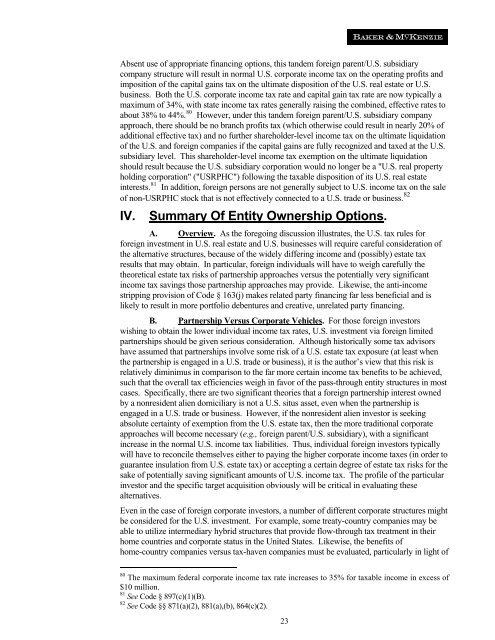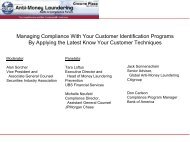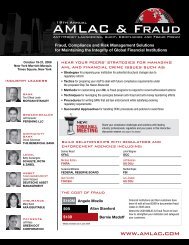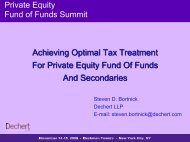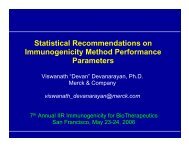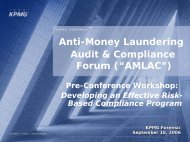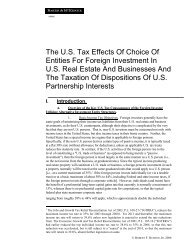The US Tax Effects Of Choice Of Entities For Foreign Investment - IIR
The US Tax Effects Of Choice Of Entities For Foreign Investment - IIR
The US Tax Effects Of Choice Of Entities For Foreign Investment - IIR
You also want an ePaper? Increase the reach of your titles
YUMPU automatically turns print PDFs into web optimized ePapers that Google loves.
Absent use of appropriate financing options, this tandem foreign parent/U.S. subsidiary<br />
company structure will result in normal U.S. corporate income tax on the operating profits and<br />
imposition of the capital gains tax on the ultimate disposition of the U.S. real estate or U.S.<br />
business. Both the U.S. corporate income tax rate and capital gain tax rate are now typically a<br />
maximum of 34%, with state income tax rates generally raising the combined, effective rates to<br />
about 38% to 44%. 80 However, under this tandem foreign parent/U.S. subsidiary company<br />
approach, there should be no branch profits tax (which otherwise could result in nearly 20% of<br />
additional effective tax) and no further shareholder-level income tax on the ultimate liquidation<br />
of the U.S. and foreign companies if the capital gains are fully recognized and taxed at the U.S.<br />
subsidiary level. This shareholder-level income tax exemption on the ultimate liquidation<br />
should result because the U.S. subsidiary corporation would no longer be a "U.S. real property<br />
holding corporation" ("<strong>US</strong>RPHC") following the taxable disposition of its U.S. real estate<br />
interests. 81 In addition, foreign persons are not generally subject to U.S. income tax on the sale<br />
of non-<strong>US</strong>RPHC stock that is not effectively connected to a U.S. trade or business. 82<br />
IV.<br />
Summary <strong>Of</strong> Entity Ownership Options.<br />
A. Overview. As the foregoing discussion illustrates, the U.S. tax rules for<br />
foreign investment in U.S. real estate and U.S. businesses will require careful consideration of<br />
the alternative structures, because of the widely differing income and (possibly) estate tax<br />
results that may obtain. In particular, foreign individuals will have to weigh carefully the<br />
theoretical estate tax risks of partnership approaches versus the potentially very significant<br />
income tax savings those partnership approaches may provide. Likewise, the anti-income<br />
stripping provision of Code § 163(j) makes related party financing far less beneficial and is<br />
likely to result in more portfolio debentures and creative, unrelated party financing.<br />
B. Partnership Versus Corporate Vehicles. <strong>For</strong> those foreign investors<br />
wishing to obtain the lower individual income tax rates, U.S. investment via foreign limited<br />
partnerships should be given serious consideration. Although historically some tax advisors<br />
have assumed that partnerships involve some risk of a U.S. estate tax exposure (at least when<br />
the partnership is engaged in a U.S. trade or business), it is the author’s view that this risk is<br />
relatively diminimus in comparison to the far more certain income tax benefits to be achieved,<br />
such that the overall tax efficiencies weigh in favor of the pass-through entity structures in most<br />
cases. Specifically, there are two significant theories that a foreign partnership interest owned<br />
by a nonresident alien domiciliary is not a U.S. situs asset, even when the partnership is<br />
engaged in a U.S. trade or business. However, if the nonresident alien investor is seeking<br />
absolute certainty of exemption from the U.S. estate tax, then the more traditional corporate<br />
approaches will become necessary (e.g., foreign parent/U.S. subsidiary), with a significant<br />
increase in the normal U.S. income tax liabilities. Thus, individual foreign investors typically<br />
will have to reconcile themselves either to paying the higher corporate income taxes (in order to<br />
guarantee insulation from U.S. estate tax) or accepting a certain degree of estate tax risks for the<br />
sake of potentially saving significant amounts of U.S. income tax. <strong>The</strong> profile of the particular<br />
investor and the specific target acquisition obviously will be critical in evaluating these<br />
alternatives.<br />
Even in the case of foreign corporate investors, a number of different corporate structures might<br />
be considered for the U.S. investment. <strong>For</strong> example, some treaty-country companies may be<br />
able to utilize intermediary hybrid structures that provide flow-through tax treatment in their<br />
home countries and corporate status in the United States. Likewise, the benefits of<br />
home-country companies versus tax-haven companies must be evaluated, particularly in light of<br />
80 <strong>The</strong> maximum federal corporate income tax rate increases to 35% for taxable income in excess of<br />
$10 million.<br />
81 See Code § 897(c)(1)(B).<br />
82 See Code §§ 871(a)(2), 881(a),(b), 864(c)(2).<br />
23


